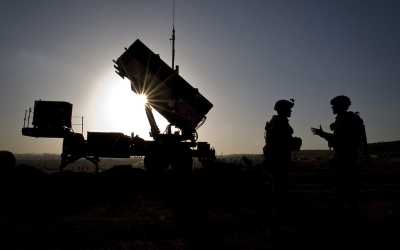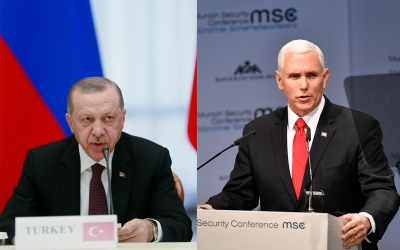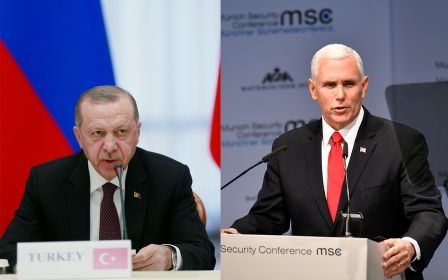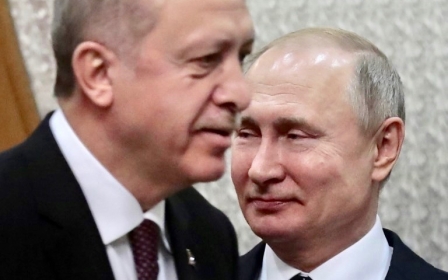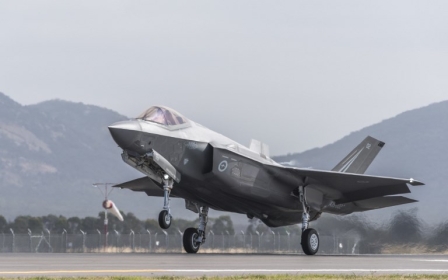'Not serious': Turkey dismisses US pressure on Patriot missile deal as deadline looms
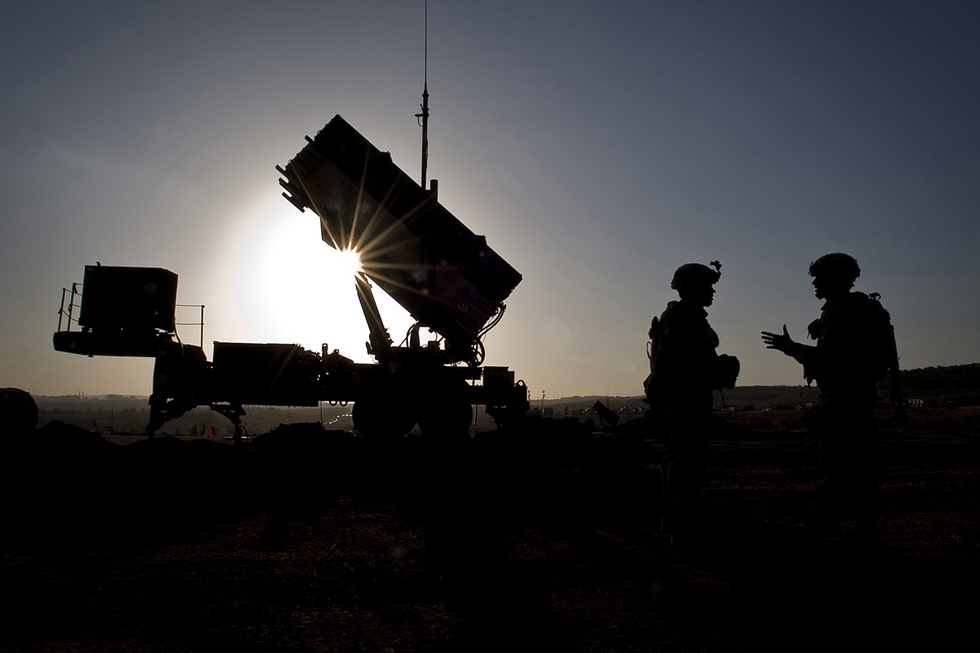
Turkish officials have privately dismissed the prospect of Ankara concluding a deal to buy the US-built Patriot missile system after Washington demanded an immediate payment of $1 billion and made any sale conditional on Turkey abandoning plans to acquire a rival system from Russia.
The US offer to supply the Patriot to Turkey in a $3.5bn sale has been on the table since January. Ankara has until the end of March to formally respond, and has not yet even indicated unofficially whether it intends to pursue the deal, MEE understands.
But officials involved in the negotiations told Middle East Eye that they had quickly concluded that Washington's offer to its NATO ally was not a serious one.
"It came with conditions that were very hard to meet at that point," one official recalled, speaking on condition of anonymity.
US officials informally told their Turkish counterparts that they had just one week to decide whether to take or leave the deal and also insisted that Turkey make a down payment of between $800m and $1bn within the same timeframe despite an economic crisis in which the value of the lira has plunged against the dollar.
They also said any sale would be contingent on Turkey cancelling its purchase of Russian-made S-400 missile systems, which are due to be delivered into Turkish hands in July.
Another official, also speaking on condition of anonymity, summed up the Turkish reaction: "No, this isn’t a serious offer.”
A State Department spokesperson, speaking on condition of anonymity due to diplomatic protocol, confirmed to MEE that the US had presented a Letter of Offer and Acceptance (LOA) to Turkey to purchase the Patriot system in January and confirmed that the offer was conditional on the cancellation of Turkey's acquisition of S-400s.
“We have made it clear that if Turkey acquires the S-400, we will not provide Patriot,” the spokesperson said.
S-400 crisis
The so-called S-400 crisis has been rumbling for more than two years since Turkey first announced its intention to buy the Russian air defence system in 2017, rattling the US government and the US defence establishment.
Concerns were initially focused on the fact that S-400s were not interoperable with NATO air defence systems. Later, US defence officials raised concerns that the proposed deal could allow Russia to gather intelligence about the fifth generation of the F-35 fighter jet.
Turkey plans to buy dozens of the Lockheed Martin-manufactured jet, and is also a programme partner in the project with Turkish defence companies producing some components for the plane.
US officials have been pressuring Turkey to drop the deal yet were failing to come up with an alternative due to Turkish demands of expedited delivery, tech transfer and joint production.
Congress has also resisted sales of military equipment to Turkey because of criticism of Ankara's human rights record and concerns that it is seeking closer ties with Russia.
The State Department has nonetheless been pushing ahead with the proposed Patriot sale, with officials suggesting that systems which have already been produced, and which were intended for other countries, could be delivered to Turkey this year to meet its delivery demands.
Mixed messages
But Turkish officials said that doubts remained that Washington could deliver on any agreed deal, and also expressed frustration about mixed messages being sent by US President Donald Trump and US diplomats.
“They polish the proposed deal as something extraordinary. In reality, they don’t even have a proper timetable for the delivery. Let’s say they have it. When would these systems be put in place? When would the military officers who would operate these systems be trained? They don’t have these answers,” said one official.
In conversations with Turkish officials, US diplomats have also warned Turkey about the consequences of the S-400 deal.
The Trump administration is mandated to sanction countries that conduct transactions with the Russian military industry, according to a law ratified by the US Congress in 2017, called CAATSA, or the Countering America's Adversaries Through Sanctions Act.
Congress has also ratified legislation that effectively blocks the transfer of F-35s to Turkey. Yet Turkey has already taken delivery of two of the jets, although they remain in the US where Turkish pilots are receiving training in Arizona.
The State Department spokesperson told MEE that the US would not stand idly by while NATO allies purchase weapons from US adversaries.
“We have clearly warned Turkey that its acquiring of the S-400 forces us to reassess Turkey’s participation in the F-35 programme, risks future arms transfers to Turkey, and exposes Turkey to sanctions under CAATSA.”
Vice President Mike Pence and US President Donald Trump both made phone calls to Turkish President Recep Tayyip Erdogan last month in an effort to convince him to drop the S-400 deal.
Turkish officials say Trump told Erdogan that he would do his best to find a solution to prevent sanctions from being imposed on Turkey.
But Trump's pledge was quickly contradicted by US diplomats, the second Turkish official said.
“What followed that phone call was quite telling. US diplomats told us that what Trump said in the phone call essentially didn’t matter. Because they were still very serious about sanctions," he said.
Some analysts suggest that there could yet be a face-saving solution to the crisis that threatens to have significant implications on the F-35 deliveries and the local production of F-16 fighter jets.
The Istanbul-based Centre for Economics and Foreign Policy Studies (EDAM) think tank proposed in a latest policy report that Turkey could buy a less sophisticated system from Russia that wouldn’t anger Moscow and would alleviate Washington’s concerns.
“The military cooperation with Russia could focus on short-to-medium range mobile air defence systems that combine anti-aircraft artillery and surface-to-air missiles. Acquiring such a capability would provide ground troops with reliable protection, especially when conducting cross-border incursions,” the report said.
'Yes or no answer'
But neither Turkish nor US officials seem to be interested in finding a third solution to the crisis. The third Turkish official said the US delegation would not even listen to the alternative solutions.
"They only want a yes or no answer to their proposal. And that's it," he said.
Officials in Ankara also expressed frustration about the broader state of Turkish-American relations, describing a state of complete chaos in Washington in which promises given by Trump are not honoured by lower-ranking government officials.
Officials say US officials are yet to keep their word on the Manbij roadmap to remove US-allied Kurdish fighters from the northern Syrian town, which was struck last June with an informal understanding of 120 days of execution.
“It's been 10 months. And it isn’t going anywhere,” said a source close to the Turkish government.
Then, there is the deal which led to the release of Andrew Brunson, the American pastor who was imprisoned in Turkey on charges of supporting an attempted coup against Erdogan in 2016.
Ankara released Brunson in October on the understanding that Washington would begin to process the extradition of Mehmet Hakan Atilla, a former deputy general manager of Turkish bank Halkbank, who is serving a prison sentence in New York on charges of violating Iran sanctions.
Washington, in diplomatic talks, also promised Ankara that the US Treasury would be lenient towards Halkbank in fines imposed in connection with the case, but no progress has been made.
Erdogan, who is campaigning ahead of local elections later this month, has repeatedly told media in recent weeks that he will not reverse his decision on the S-400 deal. Yet he said last week that Turkey and the US would find a solution to the crisis. “As in the past, clear heads will prevail,” he declared.
Middle East Eye delivers independent and unrivalled coverage and analysis of the Middle East, North Africa and beyond. To learn more about republishing this content and the associated fees, please fill out this form. More about MEE can be found here.


